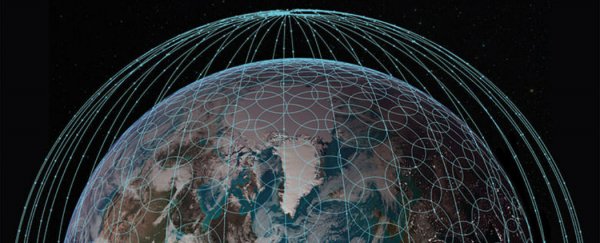A new report from tech giant Samsung proposes that a fleet of roughly 4,600 micro-satellites orbiting Earth could solve our impending data crisis.
Predicting that by 2028, 5 billion Internet users around the world will be collectively chewing through at least 1 zettabyte per month - to put that in perspective, 1 zettabyte is 1,000 exabytes, 1 exabyte is 1,000 petabytes, and 1 petabyte is 1,000 terabytes - the report says we're going to have to think seriously about how we can deliver that. A constellation of tiny Internet-beaming satellites could be a viable option, it says, and Samsung could be the one to build it.
The report, entitled Mobile Internet from the Heavens, describes an Internet satellite system that will avoid the latency issues of current communications satellites by being positioned much closer to Earth. "Most modern communications satellites live in geostationary orbit, roughly 35,000 kilometres above the surface, and this imposes a hard limit on speed due to travel time for the data transmissions," Graham Templeton writes for ExtremeTech. "Samsung wants to position its constellation in Low Earth Orbit (LEO) and thus reduce this delay."
Since the fleet of micro-satellites will be constantly moving around, with no one satellite dedicated to a particular patch of Earth, Samsung predicts that it will need about 4,600 of them to ensure constant coverage everywhere on the planet.
This is not the first time a universal 'space Internet' has been proposed. In June, SpaceX's Elon Musk requested permission from the FCC to launch a constellation of Internet-beaming satellites into Low Earth Orbit for testing, and Sir Richard Branson has raised US$500 million to develop and launch his own OneWeb space telescope system by 2019.
Closer to the ground, we have Google working on making Sri Lanka the first country on Earth with universal Internet coverage via its helium ballon system, and Facebook is following close on its heals with plans to launch Internet-beaming drones.
It's not really a surprise that some of the biggest technology companies in the world are vying for control over where we'll be getting out Internet from in the coming decades. As Templeton points out, the philanthropic bonuses for connecting the poorest and most remote regions in the world will be substantial, but what it's really about is finding a way to push your own products and services.
"Not only do you get to sell high-speed Internet to the remaining global majority that still lives without it, but you also get to bias them toward using your services on the Internet," he says. "Though it wasn't as tied to the launch of satellites, Facebook's Internet.org is an attempt to achieve much the same thing: give people without adequate access to the Iinternet a subsidised version of it, in exchange for the chance to expose them to your version of the Internet, first."
Getting an Internet-beaming satellite constellation up and running won't be easy - as Bill Gates knows all too well - and Samsung hasn't even announced whether it plans to do anything with this proposal yet. We'll just have to wait and see. I suspect the idea is an inevitability, and right now, it's anyone's game.
